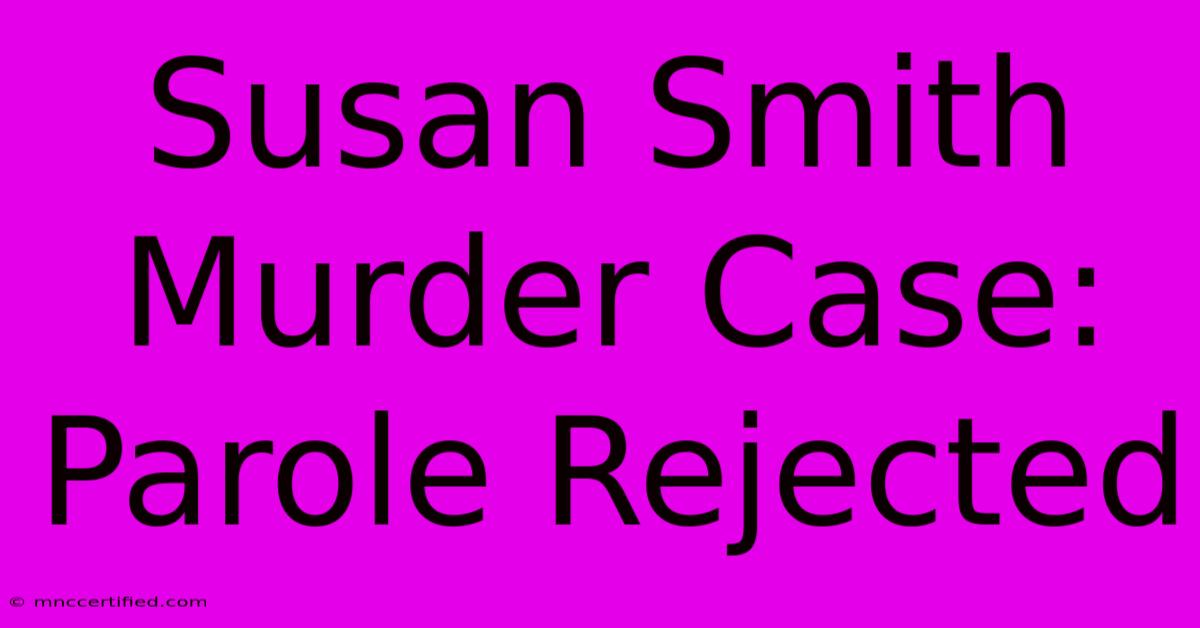Susan Smith Murder Case: Parole Rejected

Table of Contents
Susan Smith Murder Case: Parole Rejected - Again
The case of Susan Smith, who tragically murdered her two young sons in 1994, continues to haunt the public consciousness. Recently, her request for parole was once again denied, reigniting the debate surrounding her sentence and the possibility of rehabilitation. This article delves into the details of the case, the reasons behind the parole board's decision, and the enduring impact of this horrific crime.
The Infamous 1994 Case: A Nation Weeps
On October 25, 1994, Susan Smith reported her car stolen, claiming two masked men abducted her sons, three-year-old Michael and 14-month-old Alex. This sparked a massive search effort, gripping the nation with its heartbreaking narrative. Smith's seemingly distraught demeanor initially garnered public sympathy. However, nine days later, the truth emerged. Smith confessed to intentionally rolling her car into John D. Long Lake, drowning her children.
The motive, as revealed during the trial, was reportedly linked to her tumultuous relationship with a man who refused to marry her. The details of the crime shocked and horrified the public, shattering the idealized image of motherhood and exposing the darkness that can lurk beneath a seemingly normal facade. This case became a watershed moment in American criminal history, fueling discussions about domestic violence, societal pressures, and the depths of human depravity.
The Trial and Sentencing: Life Imprisonment
Smith's trial was heavily publicized, generating intense media scrutiny. The evidence presented overwhelmingly proved her guilt. She was found guilty on two counts of murder and sentenced to life imprisonment without the possibility of parole – a sentence that, at the time, was the maximum penalty available in South Carolina.
Recent Parole Hearing: Denial and Public Outrage
Smith's recent parole request, like several before it, was denied. While the specific reasoning behind the denial remains confidential, the parole board undoubtedly considered various factors, including the severity of the crime, the lack of remorse shown by Smith, and the ongoing pain suffered by the victims' family. The public outcry following the denial was significant, with many expressing outrage at the possibility of Smith’s release. This underscores the enduring impact of the case and the lack of forgiveness many feel towards Smith.
The Ongoing Debate: Rehabilitation vs. Retribution
The Susan Smith case continues to fuel a significant debate within society: the balance between rehabilitation and retribution in the justice system. Some argue that Smith deserves a second chance, pointing to potential rehabilitation efforts during her incarceration. Others maintain that the horrific nature of her crime necessitates a life sentence, emphasizing the irreversible damage inflicted upon the victims' family and society as a whole.
The Impact of the Case: A Lasting Legacy
The Susan Smith case left an indelible mark on society, prompting widespread discussion on various important issues. These include:
- Domestic Violence: The case highlighted the often-hidden pressures faced by women in abusive relationships.
- Mental Health: While not a direct excuse, the psychological factors contributing to Smith's actions spurred conversations about mental health awareness.
- Media Influence: The intensive media coverage raised questions about the role of the media in shaping public perception and influencing judicial proceedings.
- Capital Punishment: The case fueled ongoing debates about the death penalty and appropriate sentences for heinous crimes.
The Susan Smith case is more than just a tragic event; it's a complex social commentary that continues to resonate years later. Her denial of parole underscores the gravity of her actions and the enduring pain inflicted upon those affected. The case serves as a potent reminder of the importance of understanding and addressing the underlying factors that can lead to such extreme violence and ensuring justice is served.
Keywords: Susan Smith, Susan Smith parole, Susan Smith murder, Susan Smith case, John D. Long Lake, South Carolina, parole hearing, life imprisonment, murder trial, victims, family, rehabilitation, retribution, media coverage, domestic violence, mental health, capital punishment.

Thank you for visiting our website wich cover about Susan Smith Murder Case: Parole Rejected. We hope the information provided has been useful to you. Feel free to contact us if you have any questions or need further assistance. See you next time and dont miss to bookmark.
Featured Posts
-
Chromebook Insurance For Schools
Nov 21, 2024
-
Social Service Insurance Markets
Nov 21, 2024
-
Insurance For Youth Sports Teams
Nov 21, 2024
-
Superior Insurance Wilmington Nc
Nov 21, 2024
-
Owners Interest Insurance Policy
Nov 21, 2024